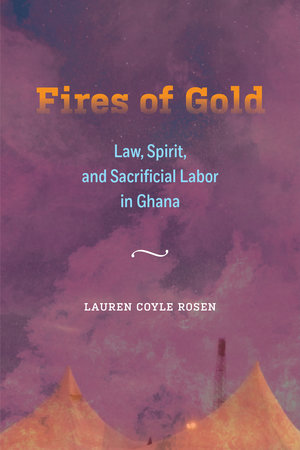As of 2019, Ghana is the country with the largest gold-mining industry in Africa, overtaking South Africa, after two South African gold mining companies shifted focus on the West African country. Small miners produce the large majority of the Ghanaian gold output, approximately one third of the country’s gold production (p. 5). In the shadow of the Ghanaian gold industry’s success story, however, loom multiple struggles over labour, land, rights, and politics. One such struggles involves artisanal miners, known as galamsey, who are of particular importance as they largely mine gold illicitly from the perspective of the mining companies. The claims on the basis of ancestral rights which galamseys make on the land in which the gold can be found, raises pertinent questions over who determines the legitimacy and legality of certain acts of mining.
Rosen’s ethnography provides important insights into the force field that structures life around Obuasi’s gold mines and goes beyond mere political and legal analysis by revealing the different forms of power, violence, and activism that complicate the success story of Ghana’s gold industry and rule-of-law system
 It is precisely the various struggles and contests over land, labour and law that Lauren Coyle Rosen’s monograph Fires of Gold (2020) analyses. Throughout her analysis, the author argues that the legal and political struggles over work and ownership of the gold mines are not entirely embedded within the formal legal structures of Ghana’s centrally governed constitutional democracy, but rather, mediated by what she terms ‘shadow sovereigns’. Secondly, such struggles involve not only earthly actors, but great importance is given to religious sovereigns and the realm of the sacred (p. 8-9).
It is precisely the various struggles and contests over land, labour and law that Lauren Coyle Rosen’s monograph Fires of Gold (2020) analyses. Throughout her analysis, the author argues that the legal and political struggles over work and ownership of the gold mines are not entirely embedded within the formal legal structures of Ghana’s centrally governed constitutional democracy, but rather, mediated by what she terms ‘shadow sovereigns’. Secondly, such struggles involve not only earthly actors, but great importance is given to religious sovereigns and the realm of the sacred (p. 8-9).
Rosen’s ethnography provides important insights into the force field that structures life around Obuasi’s gold mines and goes beyond mere political and legal analysis by revealing the different forms of power, violence, and activism that complicate the success story of Ghana’s gold industry and rule-of-law system (p. 3). This important contribution, however, is dimmed by the ethnography’s theoretical shortcomings and methodological monotony. The core questions around sovereignty, the tensions between legitimacy, legality, and illegality, as well as Rosen’s key analytic figure of the shadow sovereign, are insufficiently addressed both in theory and in their historical context in Ghana.
Fires of Gold is told through five core chapters, each densely ethnographic and starting with a tumultuous event which draws the reader into the field of conflict between mining companies, unions, spiritual authorities, and the spirits themselves. Dwelling on Rosen’s key term ‘shadow sovereign’ (p. 4), chapter one explores the fraught and often violent encounters between the galamseys and the key gold mining company AngloGold Ashanti over claims to gold. This conflict, however, is not merely about legal ownership over the mines (chapter one)- rather it is also about the different spiritual authorities that sanction certain acts of mining, that can be called upon for consultation, but that also themselves may inflict violence (chapter two and three). Chapter four goes on to explore the role of local chiefs in the mining struggle, who negotiate the disputes over distribution of land and compensation for land claimed on account of ancestral ownership (p. 96). Drawing on popular memory of a large-scale miners strike in 1999, the final chapter explores how the unionised miners deployed a range of political actions, from strikes to protests and finally lawsuits, over casualisation and poor working conditions. The rich exploration of the different actors’ perspectives, mostly by means of long interviews, participant-observation of ceremonies and events, as well as by reconstructing locally significant incidents, makes this ethnography particularly relevant for scholars interested in qualitative analyses of labour struggles. Though Rosen herself does not mention a specific intended audience for her book, Fires of Gold can be located in the wider anthropological literature on the politics of resources extraction and mining (see for example Nash 1993).
Rosen’s emphasis is on her ethnographic descriptions and qualitative interviews themselves, rather than on advancing a specific theoretical argument.
Because the author does not position her work in relation to the wider academic literature, it becomes difficult for the reader to assess the monograph’s wider relevance and contribution. Relevant references to the literature on labour and the state in Ghana, as well as academic work on gold mining are mainly found in the endnotes (p. 143), while a thorough discussion of these bodies of literature within the ethnography is almost entirely missing. Though the author suggests to study the “ethnographic implications for the classical philosophical triad of the city, the soul, and the sacred” (p. 4), only the ‘city’ gets a brief exploration – however it is neither explored explicitly ethnographically or theoretically later on in the book . Rosen’s emphasis is on her ethnographic descriptions and qualitative interviews themselves, rather than on advancing a specific theoretical argument (p.4 ). From this position, it could be argued that a long literature review might take away attention from the worlds and experienced conflicts that feature so prominently in Rosen’s ethnography. However, Rosen’s missed opportunity to locate her own work amongst that of others, made the monograph difficult to follow. Further, a more diverse display of methods, such as an analysis of court documents in Chapter 5, could have added a deeper level to the analysis, particularly given Rosen’s expertise in law.
The difficulty in writing an ethnography about a large field of struggles, as the present work attempts, lies in muddling over the particular histories and complex, sometimes contradicting, positions that produce such a field of struggle. Engaging with theory as well as history is ethnographically and politically pertinent, in order to avoid what Lila Abu-Lughod sees as the collapse of “the politics of ethnography into its poetics” (1991: 473).
Although drawing on key thinkers such as Foucault and Agamben, as well as the anthropologists Thomas Blom Hansen and Finn Stepputat, the author merely prefaces the ethnography with thin references to the debates around sovereignty, law and legitimacy. Similarly, due to the disconnect between theory and ethnography, Rosen’s key analytic lense, the shadow sovereigns, remains opaque throughout the book. Theory in anthropological writing can help make sense of different forms of struggle by connecting them throughout time and place. Meanwhile, thorough ethnography prevents a collapse into fruitless universalisms and marks the particularities of local struggles. Ethnography without theory, however, risks a depoliticisation of both anthropology and local struggles by rendering them merely local phenomena, without connecting them to the wider and even global structures that underlie the politics of struggle. The distinction between Self and Other is exacerbated in the process of under-theorising the lived realities of Rosen’s interlocutors, with whom the reader becomes acquainted only in the context of the mining struggle. Their everyday lives – which arguably inform the desire for work, less precarity, connection to the community, history, and spiritual realms (p. 50)- remain hidden.
Fires of Gold is indeed poetic. Particularly remarkable are the descriptions of the different deities and spirits, which are beautifully interwoven into the text as interlocutors in their own right.
As it stands, Fires of Gold is indeed poetic. Particularly remarkable are the descriptions of the different deities and spirits, which are beautifully interwoven into the text as interlocutors in their own rights (p. 52-53). The group of galamseys who constitute the central group of analysis, are revealed to the reader through different ethnographic vignettes, dispersed throughout the book. In every chapter, a new aspect and perspective on the galamseys is described, adding some complexity to their actions, while only hinting at the miners’ everyday wishes and desires beyond labouring. By far the most insightful, the book’s second chapter provides an intimate picture of the galamsey’s interactions with spirits on the matter of gold. Descriptions of wider Akan cosmologies are brought to life through ethnographic observations of a priestess’ servicing prospection (p. 56). These observations revert to a number of relevant research questions that Rosen raises, such as “How do the galamseys’ sacrifices – literal and metaphorical – effectively serve as sites for a powerful renegotiation of cultural justice in the realms of the city, the soul, and the sacred?” (p. 49). Regrettably, such questions remain food for thought and unanswered, rather than a prompt to actually explore the wider theoretical implications of this ethnography.
Anthropologists are fascinated with tensions, conflicts, and inconsistencies. Evocative ethnographies resist the smoothing over of such complexities by explaining the fields within which they emerge in order to add new ways of understanding social life. Lauren Coyle Rosen’s ethnography does a good job at laying bare these conflicts around the Obuasi mines in Ghana, addressing the concerns and hopes of galamsey miners, unions, spiritual leaders, local authorities, and civil society groups. However, the stated intentions of the book to address forms of casualised labour under neoliberal governance and reforms (p. 8 – 11) as well as the tensions between ideas of the rule of law and local forms of ‘shadow’ governance (p. 3) lack a thorough theoretical grounding that would connect the well-written and dense ethnography to wider discussions in the academic field.
Lauren Coyle Rosen. 2020. Fires of Gold: Law, Spirit, and Sacrificial Labor in Ghana. University of California Press.
References:
Abu-Lughod, L. (1991). Writing Against Culture. In: Recapturing Anthropology: Working in the Present. Ed. Richard Fox, pp. 137- 162. Santa Fe: School of American Research Press.
Coyle Rosen, L. (2020). Fires of gold: law, spirit, and sacrificial labor in Ghana. (Atelier: ethnographic inquiry in the twenty-first century). Oakland, California: University of California Press.
Nash, J. (1993). We Eat the Mines and the Mines Eat Us: Dependency and Exploitation in Bolivian Tin Mines. New York: Columbia University Press.
Featured Image: Photo (cropped) by Sharon McCutcheon on Unsplash.
*****
This review is a response to our call for reviews on Law, Technology and Bureaucracy. We have already published two reviews for Genocide Never Sleeps (here and here), as well as one for Dispossessed, for Uberland, for The Gray Zone, and for Sentiment, Reason and Law.



